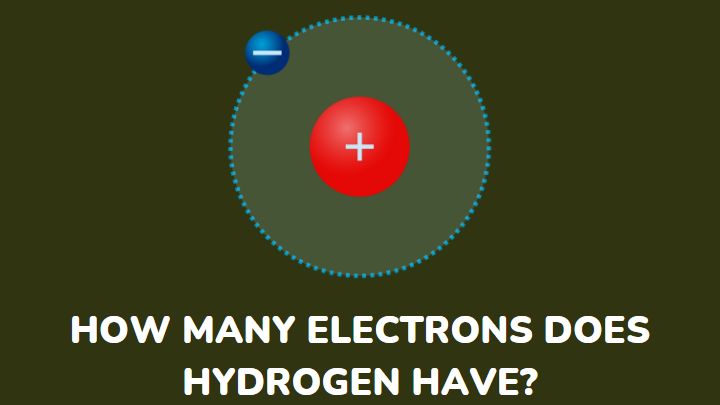Hydrogen is a unique element. In most cases, it stands by itself without being classified as a metal or nonmetal. But like group 1 metals, it has only one valence electron. Does this mean there are other electrons in a hydrogen atom?
Generally, the atomic number of an element is equal to the number of protons and the number of electrons. The protons and neutrons make up the nucleus while the electrons revolve around the nucleus.
Ahead, this article looks into the number of electrons a hydrogen atom has, other particles in the atom, and the various forms it exists in.
How many electrons does hydrogen have?
Hydrogen has only one electron in its atom. This electron revolves around the nucleus of the atom. Hydrogen can either lose this electron or gain one more to form an ion.
How many protons does hydrogen have?
Hydrogen has only one proton in its positively charged nucleus. The hydrogen atom is the simplest existing atom. The electron revolves around the nucleus.
How many neutrons does hydrogen have?
Hydrogen,1H, does not have any neutrons in its atom. Hydrogen atoms are made of only one proton and one electron.
How many isotopes does hydrogen have?
There are three hydrogen isotopes, namely: hydrogen or protium, deuterium, and tritium. All isotopes of hydrogen have an atomic number of 1 but each has its unique mass number.
Hydrogen has mass number 1 (1H), deuterium has mass number 2 (2H), and tritium has mass number 3 (3H). The isotope with mass number 1 is the most common form of hydrogen.
In addition, all isotopes of hydrogen have the same chemical properties. A major difference between these isotopes is the difference in the number of neutrons in each isotope. Hydrogen (1H) has no neutron, deuterium (2H) has one neutron, and tritium (3H) has two neutrons.
Does hydrogen form ions?
Yes. Hydrogen will lose or gain an electron to form the hydride, H–, or hydrogen ion, H+.
However, the H+ is the most common hydrogen ion. It is also known as a proton and is the most reactive hydrogen ion. It usually exists in the gaseous state or when water molecules dissociate into ions. The hydride ion is a major component of the Sun.
FAQs
What is the charge of hydrogen?
The charge of hydrogen is +1. It has only one electron, which it loses to form a cation. Moreover, the hydrogen atom is highly polarized and can accept one more electron to form a hydride ion, H-.
What is the nuclear charge of hydrogen?
Hydrogen has a nuclear charge of 1. This is the same as its atomic number.
What elements does hydrogen react with?
Hydrogen readily reacts with metals and nonmetals at high temperatures and pressures. Hydrogen is a good reducing agent for oxides and salts of metals.
While hydrogen can react with almost every element of the periodic table, it doesn’t react with inert gases such as helium, neon, argon, krypton, xenon, and radon.
Conclusion
Hydrogen has an atomic number of 1 and a mass number of 1. Therefore, it has only one proton and electron in its atom. It is important to know that all isotopes also have only one electron.
When considering the types and number of particles in the atoms of each isotope, the number of neutrons is the only difference. 1H has no neutron, 2H has one neutron, and 3H has two neutrons.
Learn further with this guide on the charge of an electron.
Thanks for reading.
Gezro has more articles on the description and characteristics of the elements of the periodic table.
